Vassar Seeks to Help Other Colleges Launch ‘Exploring Transfer’ Programs
Until this past summer, Robert Chapman had no specific plans after earning his associate’s degree at Central Maine Community College next year. But after spending six weeks on the Vassar campus in the College’s Exploring Transfer program, Chapman has decided to pursue a four-year degree. “It’s been an eye-opening experience to learn about dorm life and be exposed to challenging academics,” Chapman said. “Exploring Transfer has inspired me to widen my horizons.”
It is students like Chapman who have confirmed the belief by many at Vassar that the College is providing a valuable service—not only to the students but to the four-year colleges they attend—by hosting the Exploring Transfer program every summer. During the five-week session, the students live in college housing and take courses co-taught by teams of community college professors and members of the Vassar faculty. They also attend workshops on topics such as study skills, time management, and how to navigate the application process for four-year colleges.
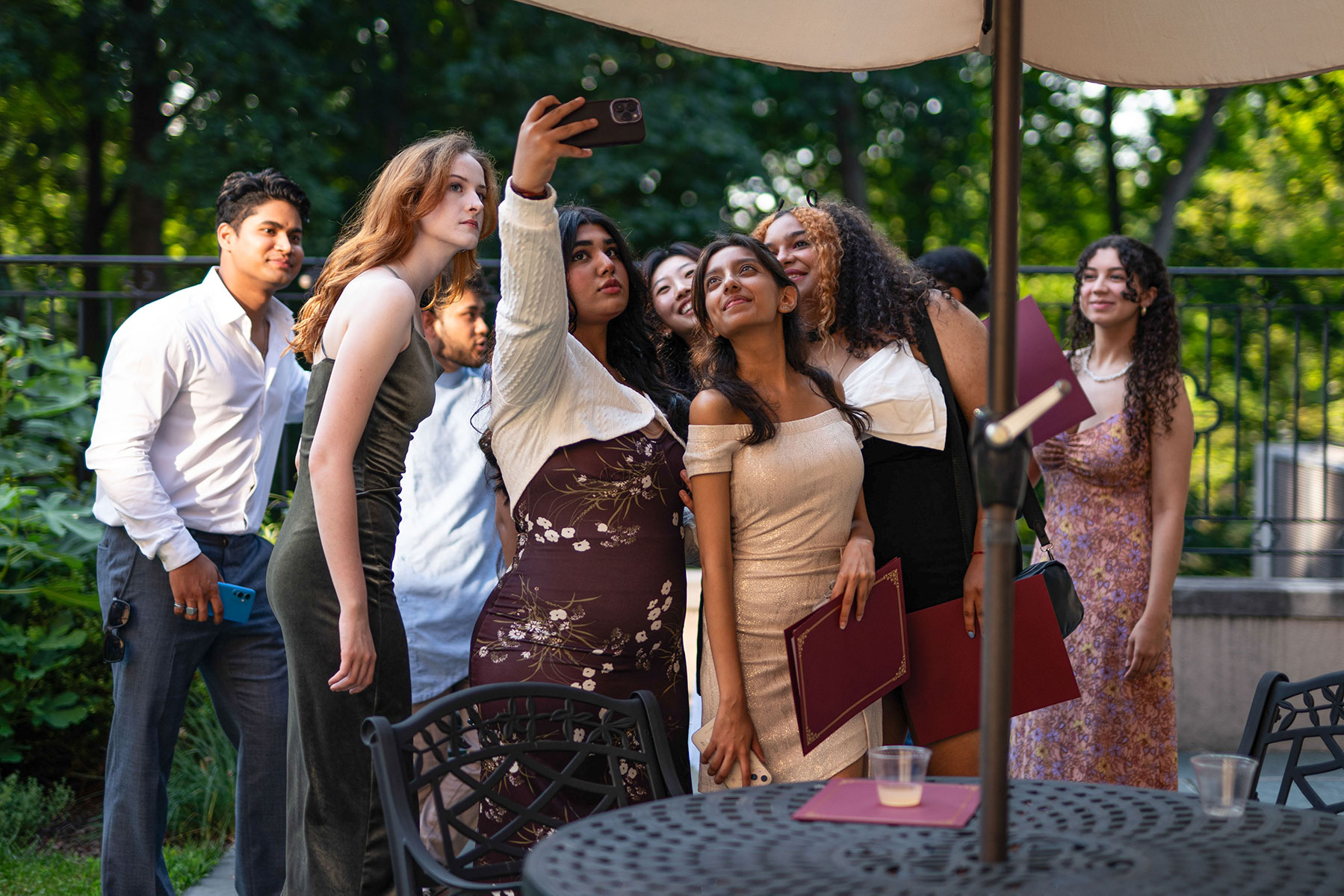
Exploring Transfer was created after a donor provided an endowment to fund it in 1985, and it has been helping hundreds of community college students achieve academic success at four-year institutions ever since. Is the program making a significant difference in the lives of those who attend? The numbers tell a compelling story. In 2022, Vassar conducted a survey of ET graduates indicating that many of them had been just as inspired as Chapman to widen their horizons. And while only about 15 percent of all community college graduates go on to attain four-year or post-graduate degrees, more than 70 percent of those enrolled in Exploring Transfer since 2008 have done so.
The program has been so successful, in fact, that the College recently secured a grant from the ECMC Foundation to encourage other liberal arts colleges in the Northeast to consider launching Exploring Transfer-like programs of their own.
The results of this initiative have been encouraging, according to Wendy Maragh Taylor, Associate Dean of the College for Student Growth and Engagement and Principal Investigator (PI) of the ECMC grant. “In the first year of the grant, we have had some very successful convenings with our community college partners and with four-year institutions,” Maragh Taylor said. “We’re excited that there are ongoing conversations with some of our peer liberal arts institutions about piloting an ET-like program. In the second year of the grant, we will spend time coaching and serving as consultants to them to see what’s possible on their campuses.”
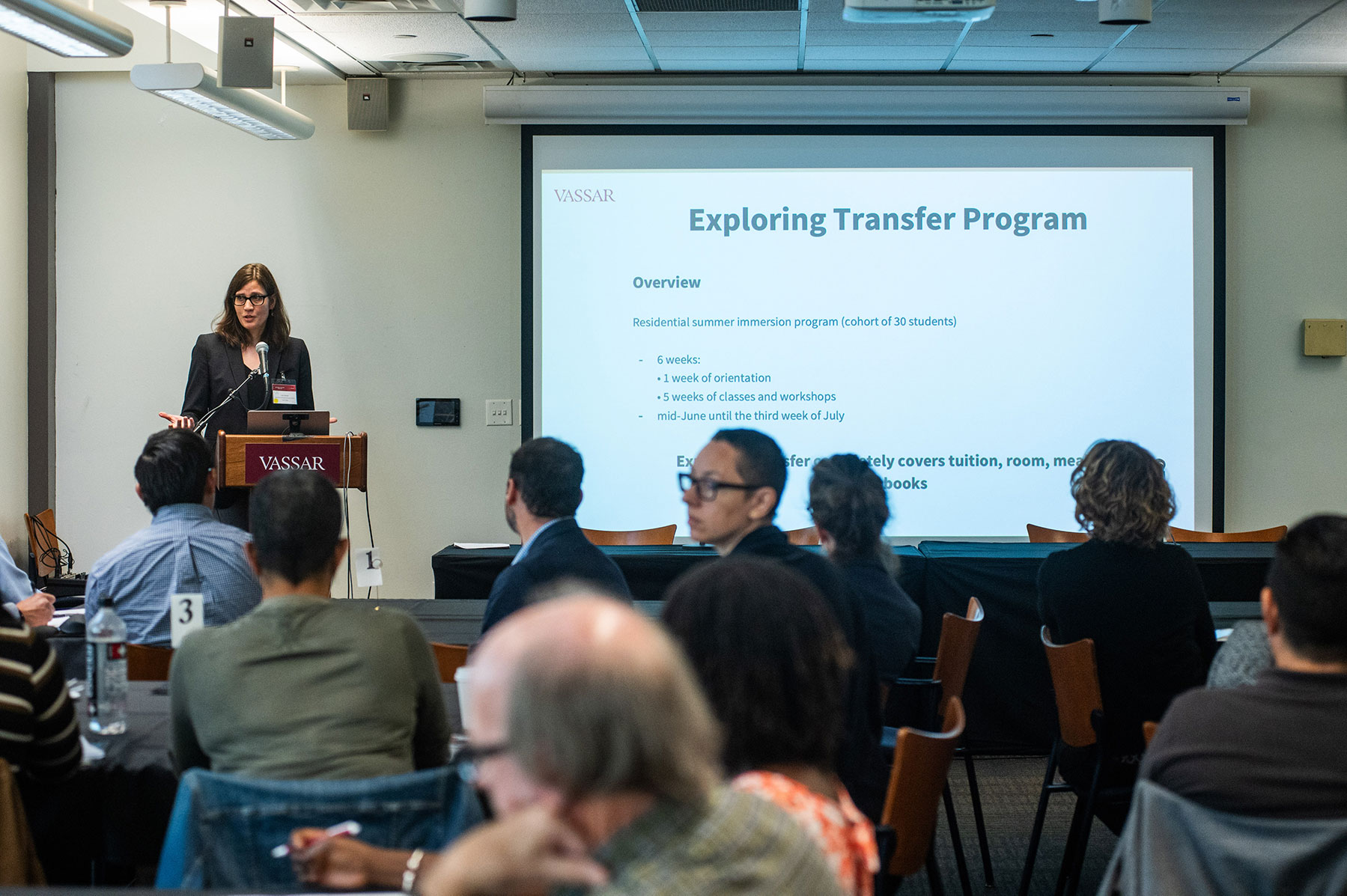
Vassar’s initiative took another step forward on October 26 when the College hosted a day-long conference attended by representatives of eight community colleges and eight four-year institutions. The participants heard from Exploring Transfer graduates and discussed the benefits and challenges of creating such programs at other four-year institutions. Two-year colleges represented at the conference were: Dutchess Community College, Ulster County Community College, Borough of Manhattan Community College, Westchester Community College, Orange County Community College, City College of New York at Kingsborough, Bunker Hill Community College, and LaGuardia Community College. Four-year institutions represented at the conference were: Diné College, Bowdoin College, Ithaca College, Franklin and Marshall University, Smith College, Trinity (CT) College, Bryn Mawr College, and Bard College.
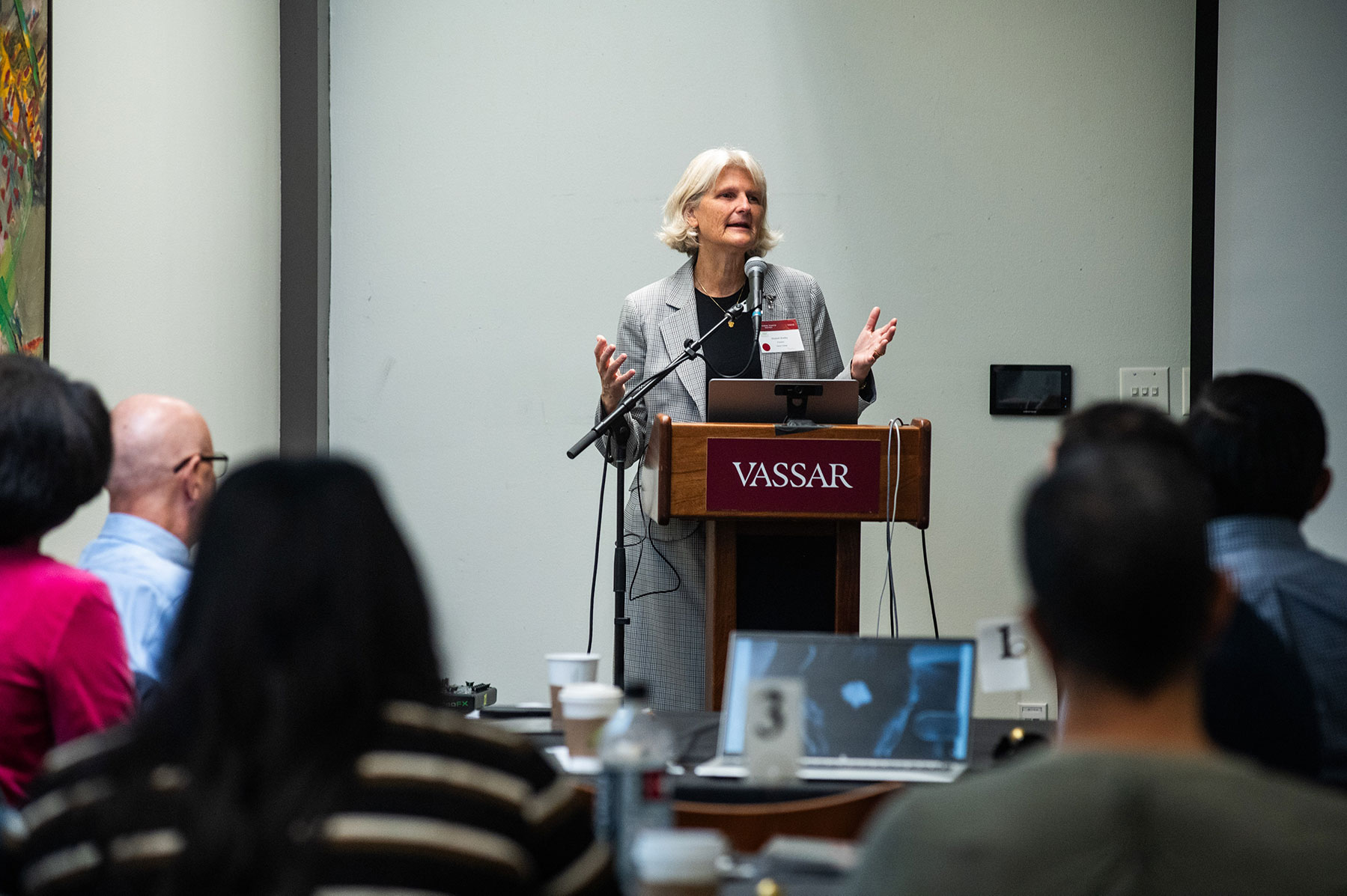
Vassar President Elizabeth H. Bradley told those gathered at the conference that Exploring Transfer reflects the College’s vision of enhancing equity and inclusion in higher education. “Working with our community college partners brings so much to that mission,” Bradley said. “Eighty percent of community college students say they want to graduate from a four-year institution but less than 25 percent ever do. We have to start somewhere to increase that number, and if we can get three or four colleges to create such a program, we will have done a good job.”
Stephen Handel, Director of Strategy in Postsecondary Education at ECMC, said initiatives that spur relationships between community colleges and four-year institutions are particularly important in helping students from underserved groups, such as students raising children, and men of color, achieve success. “Community colleges and four-year colleges don’t spend enough time talking to each other about these issues, and that’s why this convening today is so important,” Handel said.
Exploring Transfer Program Manager Charlotte Gullick said that since Vassar secured the grant from ECMC last year, members of the Vassar grant team had been meeting with representatives of other four-year institutions, and specifically met with seven colleges that had expressed particular interest: Amherst, Mount Holyoke, Smith, Haverford, Bryn Mawr, Sarah Lawrence, and Manhattanville. Gullick said those college officials appeared to be “emotionally in favor of creating such a program.”
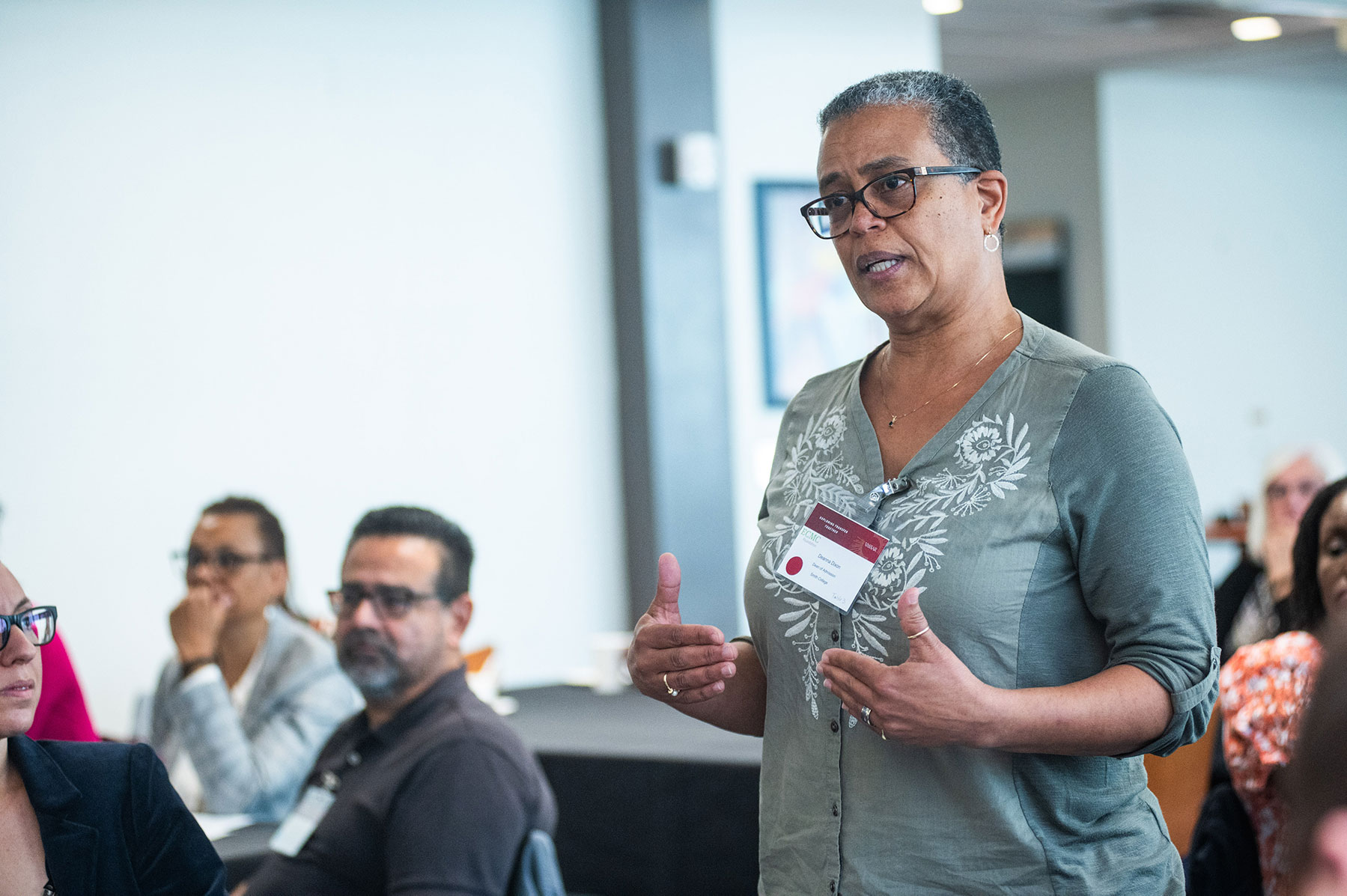
While adopting Vassar’s Exploring Transfer model in its entirety may not be possible at many institutions, one conference attendee said she believed there were other ways to achieve some of the program’s goals. “For us, money is a real issue,” said Jennifer Loscialpo, Senior Admissions Director for transfer at Trinity (CT) College, “but we see the benefits of such a program. There may be other ways for us to encourage community college students to transfer by creating workshops for them on our campus and continuing to build strong relationships with community colleges to help their students overcome some of the hurdles.”
In a panel discussion at the conference, graduates of Vassar’s Exploring Transfer program said it had transformed their lives. “Exploring Transfer helped me grow, both emotionally and academically,” Marie Dere, who transferred from LaGuardia Community College and graduated from Columbia University with a degree in sociology, told those at the conference. “Do not underestimate the change you can make in a person’s life with a program like this.”
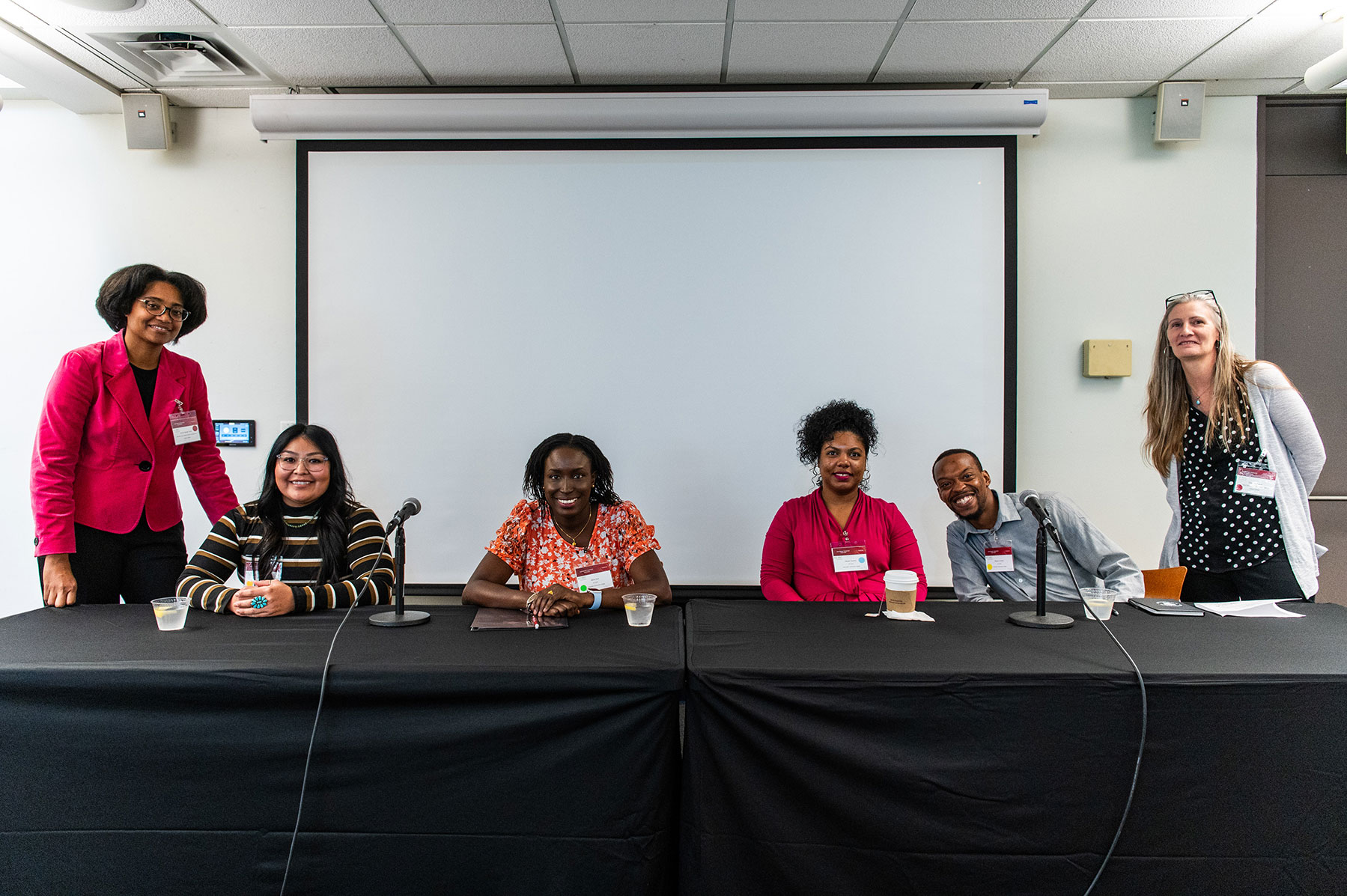
Medeli Tavarez, who earned a bachelor’s degree from the City College of New York, said she often uses the skills she acquired during her Exploring Transfer experience when she counsels clients as a Career Development Specialist at the Women’s Housing and Economic Development Corporation in the Bronx. “I’m able to help my clients, especially first-generation Americans, think creatively—outside the box—in ways that Exploring Transfer taught me,” Taverez said.
Dean Maragh Taylor said she believed that programs like Exploring Transfer have become even more critical to colleges wishing to retain and enhance the diversity of their student bodies in the wake of the Supreme Court decision barring colleges from considering race as a criterion for admission. “Exploring Transfer students are typically first-generation college students from low-income backgrounds, and they are primarily students of color,” she said. “Exploring Transfer can be an impactful way to help marginalized students accomplish their goals.”
Students enrolled in this summer’s Exploring Transfer program confirmed Maragh Taylor’s observations. Katherine Bueno, a student at Westchester (NY) Community College, said her time on the Vassar campus was her first away from home. “It really made me understand the four-year college experience, sharing space with other students in the dorm and taking demanding courses together,” Bueno said. “By the end of the five weeks, we were all like family.”
Gabriella Paltoo-Sierra, who took a course with Bueno during this summer’s Exploring Transfer session, said the experience was certain to help her acclimate when she enrolled in Williams College in the fall. “I felt I really needed something like Exploring Transfer to prepare me for my next academic experience,” Paltoo-Sierra said. “I learned a lot about time management in a challenging academic setting.”
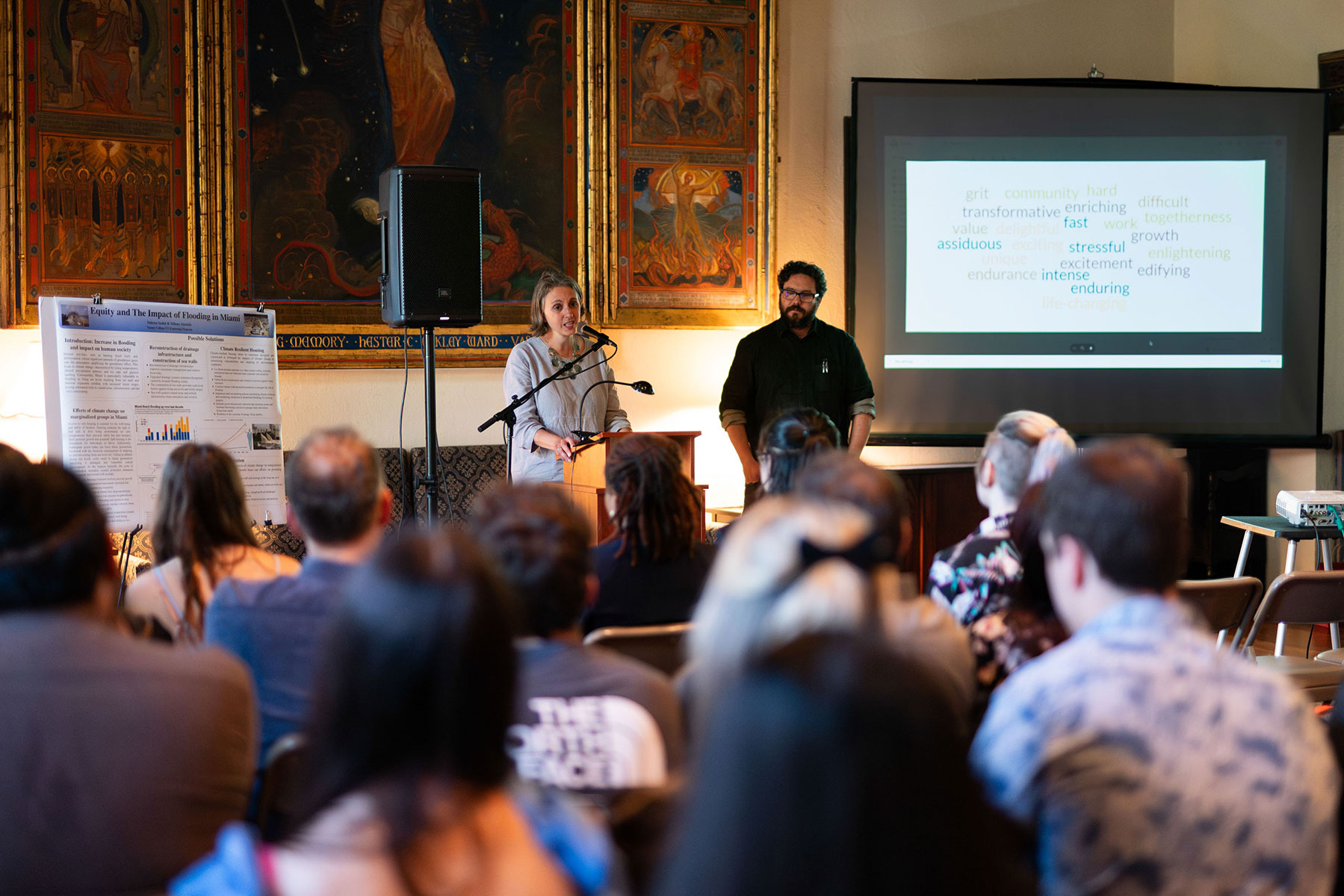
Vassar Associate Professor of Chemistry Alison Keimowitz, who co-taught one of the classes taken by Bueno and Paltoo-Sierra, took part in Exploring Transfer for the first time this summer. She said she was impressed by the students’ attentiveness and fully supported the program’s goals. “I want to do anything I can to promote a more inclusive student body at Vassar and other liberal arts colleges,” Keimowitz said. “It’s something Vassar strives to do, but we are still skewed toward the more traditional liberal arts college student.”
Another Exploring Transfer faculty member, Orange County (NY) Community College English Professor Marybeth McDonough, said she was “sold” on the program soon after she began co-teaching a course this summer with Vassar Associate Professor of Psychological Science Mark Cleaveland. “We had some amazing students,” McDonough said. “Some have a clear career path in mind, while others are just learning about the value of a four-year college degree.
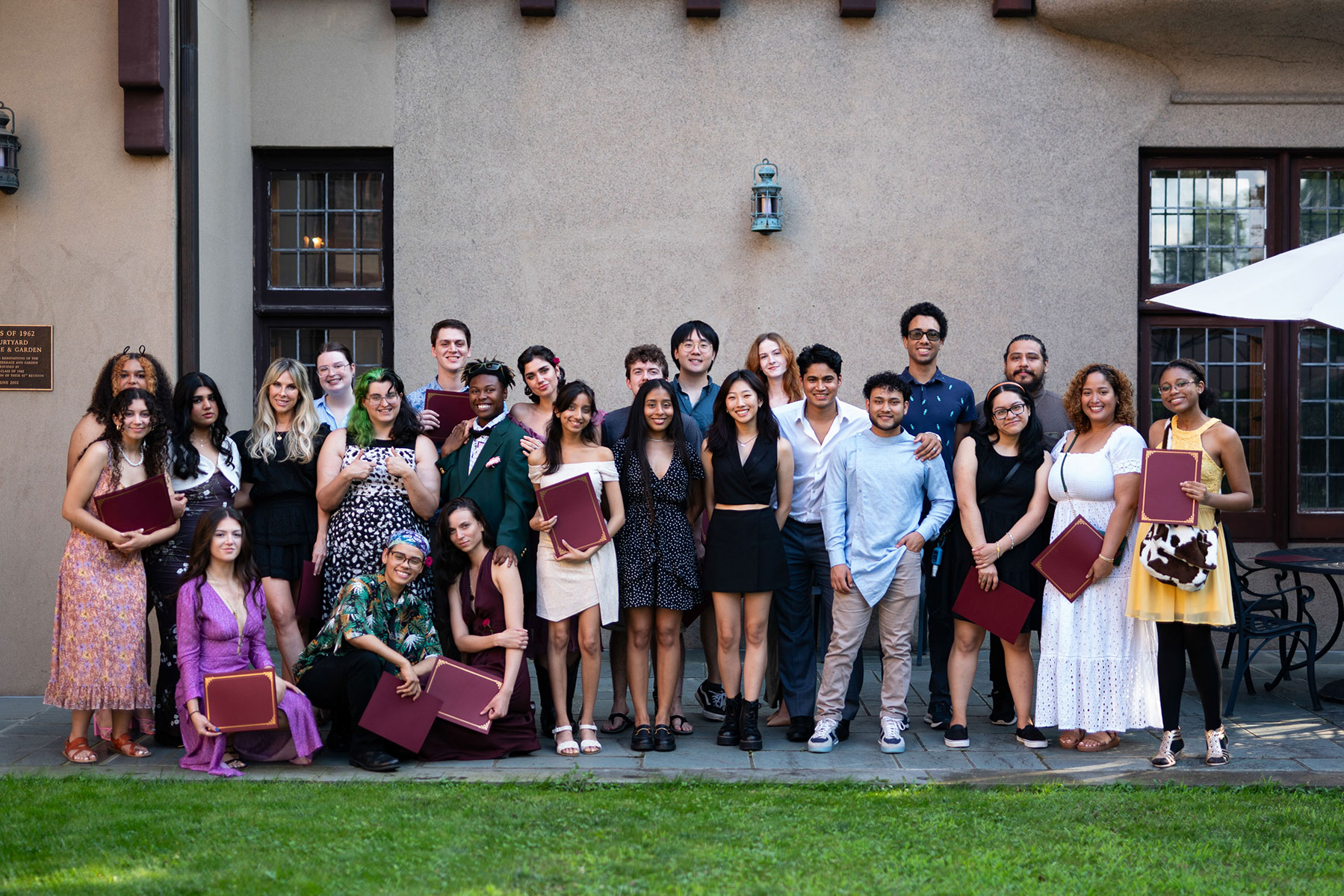
“I wish more people knew about Exploring Transfer,” she said. “Many more students could benefit; colleges could use it to help them change the world.”